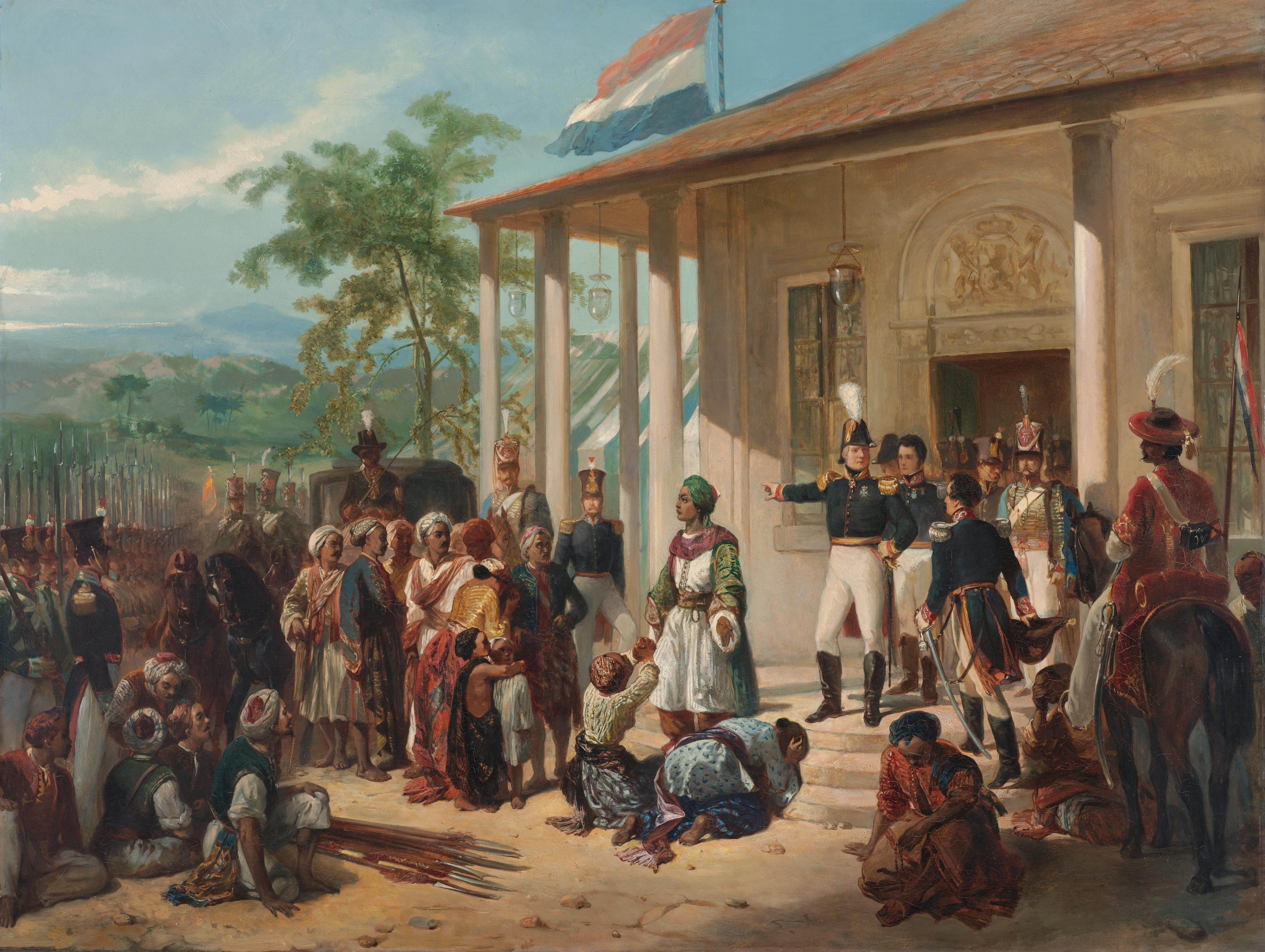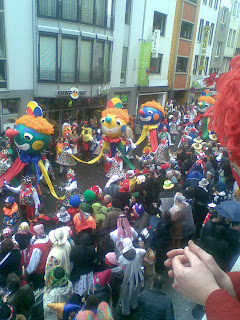After a brief visit to Fort Jago, Susie, my local guide, led me down the steep hill and through a maze of side streets around Elmina’s old Dutch Cemetary with its 19th century headstones and monuments, past outdoor markets and working-class bars and restaurants with curious names like “Have Patience” and “Believe in God”. Susie was one of the cleaning ladies at my hotel, the Bridge House. The hotel manager had suggested she would be a suitable guide to escort me around the town.
 Fort St. Jago in Elmina, Ghana
Fort St. Jago in Elmina, GhanaCousins and friends called out from back yards and front stoops, saluting with a raised hand and then lowering it into a clenched fist, which Susie explained with a giggle meant hello and then “I’m well”.
“Hello, I’m Susie’s older sister,” shouted one in English, up to her elbows in a basin of laundry. “Are you her new husband? I want to welcome you to the family!” Eyes all turned to me.
“Not yet,” I replied with a half serious expression, playing along with the familiar story. “But I think next week she may be my wife.” This elicited peals of laughter and excited jabbering in Fanti, especially from Susie.
“OK, fine,” replied the older sister with arms spread wide. “We will be waiting for you!”
Susie’s free-spirited laugh tossed her hair, tall above her head and bundled back with a tie, so that it bounced against her shoulder. She stumbled a bit to the right, dipping down and putting up her hands in mock defense against my smile, as West African women often do when they are both amused and a bit embarrassed, particularly around men.

We reached the main highway after a leisurely stroll of about a half an hour, though the stifling humidity of the late afternoon made it seem even longer. I patted myself dry with the loose ends of my shirt, trying to distribute the sweat around a bit so as to avoid showing those concentrated patches around the stomach and in the small of the back. Susie seemed completely unaffected, and clucked in sympathy when she realized I might be uncomfortable.
Two boys were at the junction, loading huge sacks onto a wooden cart, the flat-bed kind with car tires and a pull handle. I studied them for a moment, and they smiled and waved in greeting. “Obruni, gari!” they shouted as they heaved another sack of grated and dried cassava on top of their growing pile. Two women chewed sticks and watched impassively from under a nearby tree; presumably it was their gari, which had perhaps just been deposited there by a truck travelling from a nearby village. The boys would be wheeling it on their cart to a nearby market where the gari would be sold the next day.

Taxis were also parked there for the evening wash and polish. Drivers, mostly barefoot and stripped to the waist, used a pressure gun attached to a hose at a nearby house to blast the day’s accumulated mud and grime from around the wheels and undercarriage. Others applied polish and buffed with a cloth, or cleaned off headlights and windshields. A driver called out and asked where we were going, perhaps thinking we might need a ride to one of the nearby luxury hotels, a nice fare to finish off the day without passing through any of the muckier side streets. Susie disappointed him, pointing across the highway at the Java Museum as we waited for a break in the traffic.

A sign on the museum entrance proclaimed that I would pay 5 cedis while Susie would pay 50 pesewas (total about $5), and that the museum was open. The door, however, was locked, which wasn’t particularly surprising given that the sun was setting. Susie and I paused for a moment to discuss what we thought might be inside a museum about java – the history of coffee perhaps? – and giving whoever might be inside or out back an opportunity to discover us before we ran off with our money. We did not wait long.
An old woman poked her head out the door to greet us. “You are welcome! Please come inside. The manager is coming. You are welcome! Please, you are welcome!” The word “akwaaba” in Fanti is loosely translated as “you are welcome” in English, and since Ghanaians tend to say “akwaaba” several times, they also tend to say “you are welcome” several times.
Inside, the old woman left Susie and me to wander among several table displays of old documents and photographs. In the corner was a mannequin, life size and presumably representing a young African man, wearing an old Dutch military uniform dating perhaps from the early 1900s, standing at attention, one hand on a saber hanging from his belt. Behind him were two photographic portraits, seemingly quite old as well, presumably representing the same soldier. The one on top was of a young man in uniform, while the one below showed an older man sitting, in traditional West African dress, with a grey beard, leaning forward as if to speak. The small labels under each confirmed they were the same person, Jan Peek.
“That of course is not his birth name,” explained the museum manager as she bustled into the room, a small child in tow, introducing herself as Margaret. “He had an African name, probably Fanti, or maybe Ashanti, before he went off to fight with the Dutch army in Java, an island in what we now call Indonesia. You can see from the medals on his chest that he was the most decorated African soldier in the Dutch army. Very famous in Holland. You would like a tour of the museum? You are welcome!”

Margaret took us round the museum’s single room, explaining the various objects on the walls and on small tables beneath. There were old fading pictures of family reunions, with older African men seated with women from Indonesia, surrounded by black and brown faces, young and old.
“These are the extended families of the West African soldiers who joined the Dutch army and then decided, after the war, to settle in Indonesia rather than return home to Ghana. Of course, many did return, and they often settled on the small hill in Elmina known as Java Hill.”
“Oh,” Susie exclaimed. “I’ve lived in Elmina all my life and I never knew why we call it Java Hill. I can’t believe it.”
“Yes,” Margaret continued, “because of our ancestors who fought in Indonesia and then settled there, they call it Java Hill. But some of our ancestors also settled in Holland.”
 Submission of Prince Dipo Negoro to General De Kock.
Submission of Prince Dipo Negoro to General De Kock.She pointed to another photograph, this of a strikingly handsome young man with a proud expression. “This was the son of the Ashanti king, known as the Asantehene. The king gave his son to the Dutch as assurance that he would provide sufficient volunteers in return for guns and other supplies.” Margaret was quite clear to explain that the soldiers were not taken as slaves. “The British patrolled the coasts, looking for illegal slave ships. When stopped, these Ghanaian volunteers would produce their documents showing that they were free men, and the British would let the ships go.”
In one corner were several puppets of the type held from below with one hand, or perhaps perched on the head of the puppeteer hiding below the stage, the hands of the puppets manipulated with sticks. Some of the puppets had Asian faces, while others had African faces.

“The Dutch know all about these people, though here in Ghana we are at risk of forgetting this part of our history. This is why my family decided to start this museum.”
“So are you the owner of this museum?” I asked.
“My family built this house as a personal residence, but when my uncle died, we decided to place our family souvenirs in this room. The Dutch Embassy here also helped us, and several museums in Holland donated copies of their pictures and some of their artifacts.”
We did not stay long at the Java Museum, as it was growing dark outside. Margaret was happy to let us depart without paying. Since Susie was a friend of Margaret’s, and since I’d arrived on foot, it seemed my own tour was to be a gift. I presumed the museum earned most of its income from the tour buses that often jam Elmina’s tiny streets. Elimina is of course the number one tour destination outside Accra.
But I insisted on leaving 10 cedis anyway. It was really a remarkable tour, and most unexpectedly delightful. I was reminded of those many small-town museums throughout America, often pulled together by local civic leaders in honor of some special occasion, perhaps of no particular academic significance, yet important all the same to at least some segment of the local population. My mother’s town of West Point, Mississippi has one, where a little model railroad runs past a diorama depicting the town as it was a hundred or more years ago.
Margaret seemed particularly pleased that I had shown an interest in the Java Museum, which turned out to have little to do with coffee. I was touched by her obvious pride and by the remarkable way this family had found to celebrate and share its heritage. Even academics ought to find it worth a visit.




















































